|
I need to see more Marcel Carné films. Prior to receiving this disc I'd only seen one and it was a belter, though the 1945 Les Enfants du Paradis is also the one Marcel Carné film that just about everyone with a passion for movies has probably seen, or at the very least read about. I didn't catch it until 1996, when a new 35mm print was made available and we elected to screen it at the film society I help to run, which for two very localised reasons was a bit of a gamble. The first was born of the memory of previous screenings of older classics in seasons of otherwise contemporary films, only to have people stay away in droves, which meant we made a significant loss on the hire of the film and the cinema. The second is that the restored cut of the film runs for over three hours, which at this small provincial cinema with its single old projector meant a mid-film break to change reels and a late finishing time, which on previous occasions had seen some patrons leave before the end of the film to catch the last train home or even not show up at all. But the film sounded amazing and we thus booked it anyway. If no-one came then we'd console ourselves with the knowledge that we'd finally learned our lesson. The cinema was packed. Indeed, this was one of those times when I had to give up my seat and sit on the floor to help make way for everyone who'd come to see it. Of course, the film was extraordinary, and come the midway break no-one took their leave and instead stood around in groups talking enthusiastically to each other about what they'd so far seen. In a season that drew large audiences for the likes of Once Were Warriors, Suture, Thirty-Two Short Films About Glenn Gould, Three Colours: Blue, Naked (a few walk-outs on that one) and To Live, this turned out to be our most popular screening.
I'm sure opportunities have come and gone since for me to catch a few of Carné's other films, though I honestly couldn't pinpoint when. If watching and writing about film is not your full-time occupation, then you end up having to ration your viewing, and there are so many films out there and yadda-yadda-yadda. I've said it enough times and you've heard it all before. So when Arrow announced it would be releasing Carné's 1936 Hôtel du Nord on Blu-ray on the Arrow Academy label, you'd think I'd jump at the chance to cover it. And I may well have done so had I not been already committed to a number of other titles from other distributors. As if fully aware of this gaping hole in my film education, Arrow sent me a review disc anyway, and as a result I finally got to see my second Marcel Carné film. Another classic, perhaps? Oh, you'd better believe it.
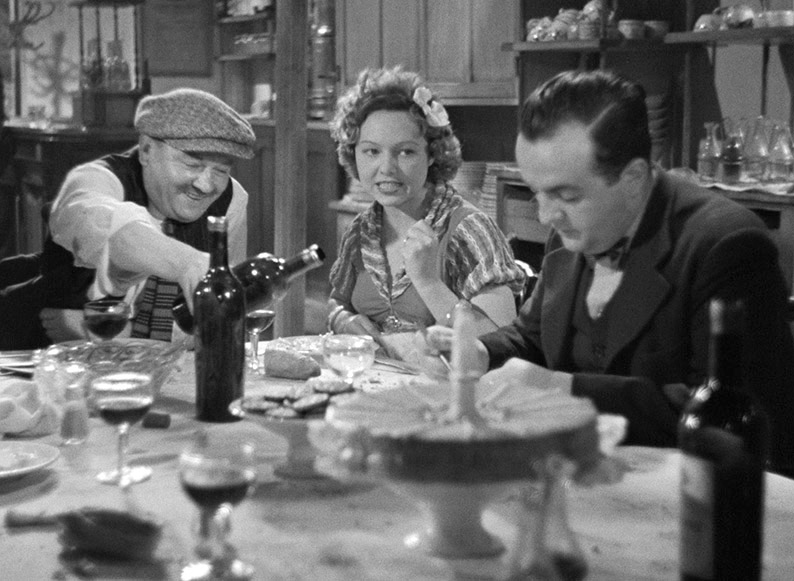
The tone for the film is set by a beautifully executed post-main titles shot, one that opens on a static wide of the Canal Saint-Martin in Paris and the adjoining street, then glides forward as a young couple cross the foreground footbridge and walk out of frame. The camera then drifts under the bridge and reconnects with the couple as they amble along the canal bank footpath, staying with them and moving in towards them as they sit and settling on them as they hold each other and look mournfully off into the distance. These two, the camera seems to be telling us, are the principal characters, and they appear to have fallen on unhappy times. But the shot's not over yet, and just a few seconds later the camera tilts upwards to focus on a building that sits by the roadside behind them, which the sign reveals is the eponymous Hôtel du Nord. Are they connected to it or is this just a decorative introduction to the principal location?
This shot then dissolves to a close-up of a cake on a table in the hotel's dining room, from which the camera pulls back to reveal a jovial and eclectic band of individuals who are sharing a meal to celebrate the first communion of young Lucette. The conversation is cheerful and peppered with seemingly throwaway lines that subtly reveal snippets of information about characters that we have yet to get to know. We get our first exposure here to Emile and Louise Lecouvreur (André Brunot and Jeanne Marken), the cheerful couple that runs the hotel and whose young son Manolo is adopted and suffers painful flashbacks of his early years in Barcelona. We also learn that the slightly morose Prosper (Bernard Blier) is a lock-keeper who sidelines in selling his blood for hospital transfusions, the mention of which triggers a brief discussion about the ethics of his second profession, a debate that will have echoes later in the story. It's only when Louise asks Lucette to take a slice of cake to the absent Raymonde (Arletty, one of several actors here credited by a single moniker) that the character focus narrows and we meet the aforementioned Raymonde and her partner Edmond (Louis Jouvet), about whom it is deceptively easy to make a few quick assumptions. His dress sense, attitude and the way he coolly cuts the piece of cake in half with a stabby-looking pocket knife are all hallmarks of a hard-nosed gangster, which effectively would cast the far livelier Raymonde as his disgruntled moll. Yet after Lucette departs, we stay with Raymonde and Edmond as they bicker and Edmond quietly wrestles with a plate camera with which he plans to find work as a freelance photographer. Wait a minute, this guy? A photographer? Maybe I misjudged him. Then, once the conversation turns to getting away from here because things are looking dodgy, I found myself doing an about-face and suspecting I'd been right in the first place. A short while later we see him in a darkroom studiously developing a print, and I was again given cause to rethink my position. This is far from the last time that I found myself wrong-footed by assumptions based on what had yet to become the movie tropes we know them as now.
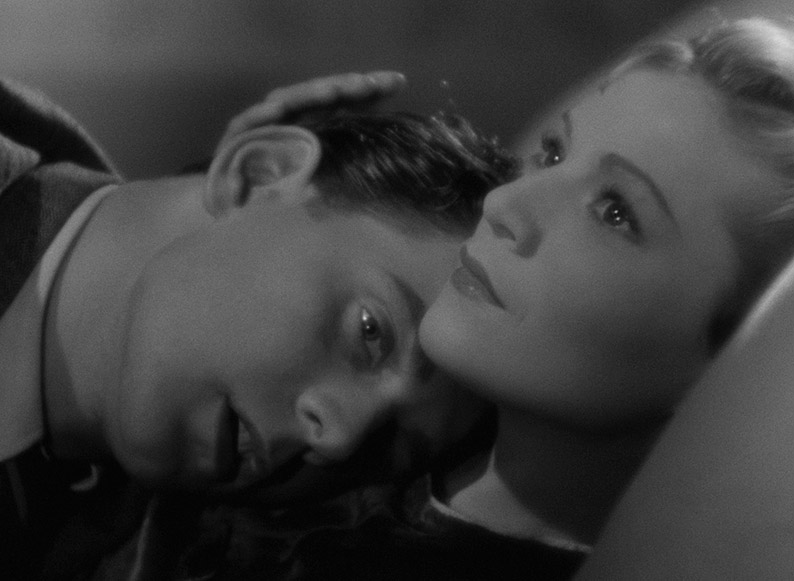
When we return to the party the conversations continue to be littered with small hints about possible plot developments to come, as Prosper's lively wife Ginette (Paulette Dubost) complains – in not so many words, but you get the gist – that she's not getting the sexual attention from her husband that she craves, which prompts the brash Kenel (played by an actor named Andrex, single moniker #2) to offer his services. Yes, this was made in 1936. A passing Raymonde is easily persuaded to join the party ("Come and have a drink!" – "I can't refuse"), and it's as things hit a peak of conversation and laughter that Renée (Annabella, single moniker #3) and Pierre (Jean-Pierre Aumont) – the couple that were followed by the camera in that opening shot – enter the hotel looking for a bed for the night. After the hotel's waitress and chambermaid Jeanne (an uncredited Raymonde – the last of the single monikers) has shown them to their room, the two stand at the window and look out at the canal and comment on its beauty and alarm bells immediately went off in my head. Another assumption? Well, yes, but this time it proved to be correct, and I wasn't alone in my concern if the worried look that Louise throws their way as they follow Jeanne is anything to go by. As Renée and Pierre converse like unhappy poets caught midway between reality and the dream world, teasing snippets emerge about their backstory and possible intentions, about which we are subtly and repeatedly misdirected. At one point Renée asks to see "our gift" and Pierre takes gun from his pocket and reminds her that it's not too late to back out, and just for a moment I suspected they were planning a crime born of desperation over what is only teasingly referred to as "our case." But when Renée responds, "Then we'd have to face life again," I just knew my initial fears were likely correct, that the two have come to the peaceful solitude of this quiet hotel room to take their own lives.
Now if it seems as if I'm tossing spoilers around like confetti at a wedding then know that by this point we're not quite 15 minutes into the film, and Carné and writers Henri Jeanson and Jean Aurenche still have a sizeable and multi-stranded story to tell, as well a fair few assumptions to turn on their heads. The next one that that I made (this is Hollywood's fault) is that Pierre and Renée's dark plans would be somehow interrupted and in the process of getting to know the life-affirming characters who inhabit and visit the hotel would give them a new appreciation for life and banish all thought of a suicide pact from their young heads. Yeah, right. As we tend to say when personal relationships aren't as rosy as could be, it's complicated, but it also proves rewarding for not playing out to as-yet unformed storytelling convention. And as the manner in which the film repeatedly plays with expectations is one of its principal pleasures, to reveal more about the plot really would get us into spoiler territory. You'll thus have to forgive the imprecision of some of what follows, as to provide more detail, and even in some cases to give names to characters, would say too much about plot turns that are far better left to Monsieur Carné and his comrades to reveal.
Given the above setup, it's perhaps unsurprising that the focus of what follows revolves principally around the impact of Renée and Pierre's actions – whatever they finally turn out to be (oh, avoiding spoilers here is going to be fun) – on the lives of Emile and Louise and their guests and bar regulars. Emerging as the central figures on this front are the intriguingly mismatched Raymonde and Edmond, who appear to be in the twilight days of a relationship that both know is doomed but that neither seems quite ready to call it quits on. My early suspicions about Edmond were reawakened when he walks in on the immediate aftermath of a violent crime, and instead of confronting the perpetrator allows him to leave and lies to the police about having seen him. Later he finds a child playing with the man's discarded weapon and buys it from him in order to keep it concealed. His exact motivation for doing either remains teasingly unconfirmed. That he has a bit of a reputation is also demonstrated when threatens a customer for harassing a girl he has taken a liking to, which prompts the bustle and chatter of the busy dining hall to suddenly stop in the manner of a bar-room confrontation from an American western. Later, in a quietly captivating scene, he reveals all about his past to the girl in question, which leads to a decision – one that is not made on screen but revealed to have been made by the temporal jump that immediately follows – that proves to life-changing for both of them.
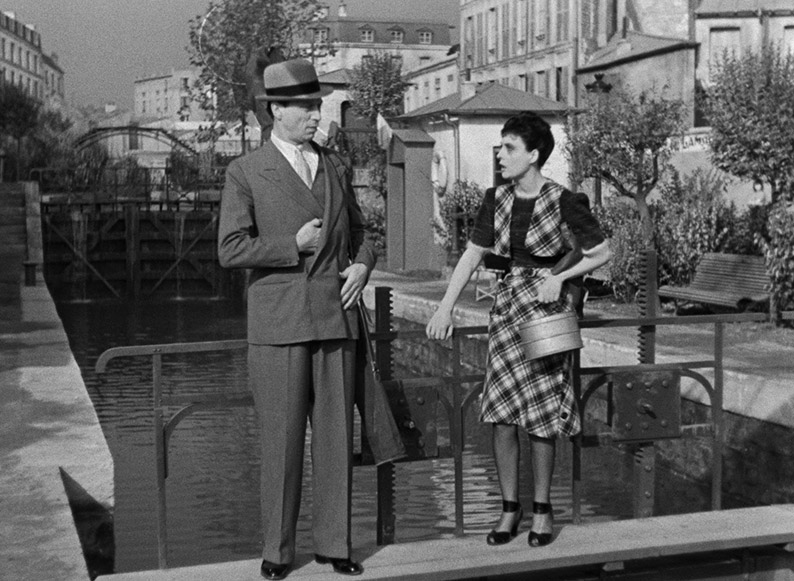
Armand Thirard and Louis Née's camera moves with poetry and purpose, locking on to characters and gliding unobtrusively with them. Elsewhere it observes them in static shots as they deliver Henri Jeanson's thoughtful and sometimes lively dialogue, which runs the gamut from the sparky wit of everyday conversation to whole sequences in which characters speak almost as if they are recalling long ago written poetry. Carné, of course, was a celebrated exponent of poetic realism, a cinematic style that he and his usual collaborator Jacques Prevert (who by this time was in Hollywood) were primary exponents of. Hôtel du Nord certainly qualifies as a poetic realist work, not just its characters and dialogue but also its setting, a real-world location that for practical reasons was recreated in its entirety as a lavish and completely convincing (and expensive) studio exterior by production designer Alexandre Trauner. Only in one scene, when a character looks down at railway lines from a bridge, does the artifice become visible, though even the just-visible fakery of this backdrop is briefly called into question by the distant sight of an approaching train, a moment of movement on a static image that closer inspection reveals was created with the aid of a light and small, window-shaped holes in the canvas.
While some scenes play out at what feels a leisurely pace (but it never is – there's not a wasted moment here), Carné also works with editor Marthe Gottié to sometimes move the story along using purely scene and shot juxtaposition. In one of my favourite examples of this filmic economy, Prosper is shown confiding to Raymonde after Ginette has left him for Kenel (an event that is not shown), in the course of which he recalls something said by Ginette that first triggered his suspicions, something Raymonde realises she has also heard from Edmond. A look of angry realisation crosses Raymonde's face, which then wipes to a similarly framed close-up of her looking unhappily at her reflection and sporting a black eye. We know instantly and without having to be told that she accused Raymond of cheating on her and that this prompted a violent response, something confirmed by the brief dialogue exchange that follows.
Knowing that the film was made back in 1936 also delivers its share of surprises, though it's easy to forget that the Production Code that put so many restrictions on the content of movies of the day applied exclusively to works being shot or distributed in America, and that filmmakers in Europe and beyond were not in any way bound by its constraints. Even so, there is some genuinely forward-looking content here. In Eugène Dabit's source novel, Raymonde was a prostitute and Edmond her pimp, and while this has not been carried over into the film, at one point a character is propositioned on the street at night by a woman who clearly shares the literary Raymonde's profession. Even more daring for its day is the unmistakable inference that well-dressed confectioner and hotel regular Adrien (François Périer) is gay, and you really don't have to read between the lines here. The first indication comes as he finishes a meal and bashfully admits to Louise that he is cleaning his apartment not for the arrival of a girl but someone he awkwardly describes as "a comrade." One evening he is asked by a female acquaintance why she's never seen him with a woman he responds simply, "I've never had the chance," and a short while later the two encounter a male friend of Adrien's who initially fails to recognise him because "I didn't even look at you when I saw you with a girl." Intriguingly, the female acquaintance then tactfully makes her excuses and leaves so the two can be alone. And in a pre-postmodernist touch Carné risks breaking the fourth wall in the final shot by having a character effectively announce that the film has come to an end. Sorry, what year was this made again?
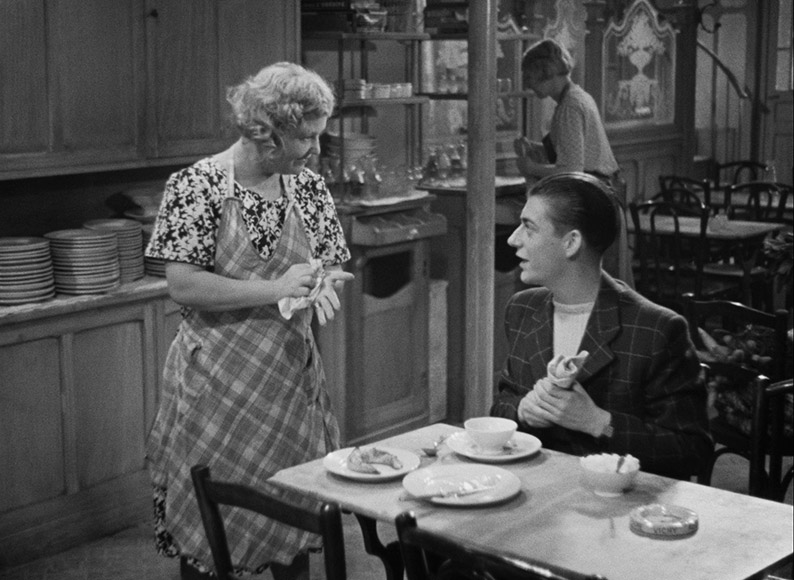
I realise that having made a pledge not to reveal how the plot unfolds, I can't discuss some of the things that so surprised and captivated me about this remarkable work. Individual scenes are mesmerising and can suddenly shift gear – one in which a former guest revisits a hotel room that has a special significance for them begins touchingly but ends with a back-and-forth exchange between Emile and Louise that had me laughing out loud – and I quickly grew fond of characters whose individual stories once again do not always play to expectations. The performances are bewitching, the direction sublime and the setting so evocatively realised that it becomes a key character in the film, so much so that when the action is briefly relocated I found myself itching to get back to the hotel to catch up with what its residents and regulars were up to. As a film experience it left me enriched, uplifted and deeply satisfied, and brought me forcibly back to my opening statement – I need to see more Marcel Carné films.
A lovely 1080p transfer from a top-notch restoration, framed in the film's original aspect ratio of 1.37:1, one whose generous and attractive tonal range nails the black levels without crushing the shadow detail or burning out the highlights. While the detail in some shots is not quite as pin-sharp as some of the showcase HD restorations of films from this period, it's still crisply defined and at a normal viewing distance looks terrific – I have a feeling that some camera filtration was used to achieve the film's visual style, and for me it works a treat. A fine film grain is visible throughout, there's not a trace of damage or dust, and the image sits solidly within the frame. A fabulous presentation of a wonderful film.
The Linear PCM 1.0 mono soundtrack shows its age more readily than the image in its narrow dynamic range and the very slight break-up of audio integrity on dialogue and music. Otherwise it's in excellent shape, with no pops or crackle or background hiss, and fluent French speakers will have no trouble following conversations without the aid of the optional English subtitles, which kick in by default but can be switched off.
Au cinema ce soir: Marcel Carné on Hôtel du Nord (25:43)
An archive interview with Marcel Carné from 1972 in which he talks in some detail about Hôtel du Nord, which pleasingly is the sole focus of this conversation. He outlines how the project came to be and talks about the casting and working with the actors, recreating the Canal Saint-Martin, researching the actual district with cinematographer Armand Thirard, why it was so hard to shoot on location back then, and more. It was here that I learned that source novel author Eugène Dabit's mother and father ran the real Hôtel du Nord and that he spent his childhood and early teenage years there, and I was pleased to hear that Dabit's parents visited the set during the shoot and were moved by the accuracy of the reconstruction.
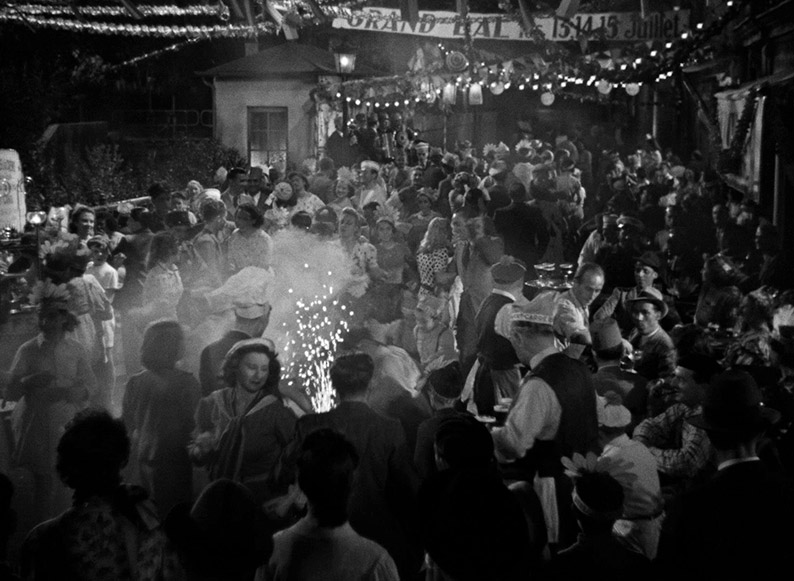
Introduction to Hôtel du Nord by Paul Ryan (19:07)
Film historian Paul Ryan, whose voice here has so much bass here that it intermittently kicked my subwoofer into play, talks about Carné as an exponent of poetic realism and his involvement with the left-wing The Popular Front, the development and casting of Hôtel du Nord, some of the changes made to Eugène Dabit's novel, the grand studio set and the impossibility of shooting on the actual location, Carné's subsequent career, accusations made that lead player Arletti collaborated with the Nazis during WWII, and more. He suggests that Henri Jeanson wrote deliberately dull dialogue for actor Jean-Pierre Aumont because he wanted a different actor for the role of Pierre, and concludes with an engaging anecdote about the actual Hotel and its relation to the one built for the film.
Image Gallery (5:10)
31 pages of promotional stills and posters that can be advanced manually or left to play out as an automated slideshow.
Theatrical Trailer (4:40)
A lengthy and elaborately produced trailer with stylish graphics and transition effects that would not have been easy to produce back in 1936. In what may or may not be a play on the film's most famous line (it's in the trailer, but only became a fan favourite with the passing of years), it also assures us that this is "a film with atmosphere."
I was a little late getting started on this one, then was further delayed by my indecision about whether to sidestep spoilers or throw a warning up and talk about aspects of the film that I eventually decided should be experienced rather than read about. As should be clear by this point, I was utterly captivated by this remarkable film, and the breaks it makes from what would only later become convention has kept it fresh and surprising over 80 years after its release. A splendid transfer and two excellent special features are the icing on the cake. Highly recommended.
|